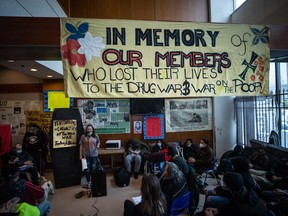Which drugs will people be permitted to possess? Why is B.C. experimenting with decriminalization? Here are the answers to these and three other questions.

B.C. is introducing a policy of decriminalization on Tuesday as part of what it says is an overall plan to prevent overdose deaths from illicit drugs.
The pilot project will continue until Jan. 31, 2026, after a federal exemption from the Controlled Drugs and Substances Act.
Start your day with a roundup of B.C.-focused news and opinion delivered straight to your inbox at 7 a.m., Monday to Friday.
Thanks for signing up!
A welcome email is on its way. If you don't see it, please check your junk folder.
The next issue of Sunrise presented by Vancouver Sun will soon be in your inbox.
Here are five things to know about decriminalization:
1. Which drugs will people be permitted to possess and how much?
Drug users will be allowed to carry up to a total of 2.5 grams of opioids such as heroin and fentanyl, as well as crack and powder cocaine, methamphetamine and MDMA, also known as ecstasy. B.C.’s application to the federal government called for 4.5 grams, but police requested one gram before a decision by Ottawa to allow a cumulative 2.5 grams.
2. Why is B.C. decriminalizing people who possess illegal drugs?
The province says it aims to reduce stigma around drug use, so people reach out for help to get services like counselling and treatment in the midst of the crisis that has claimed over 11,000 lives since a public health emergency was declared in April 2016. The B.C. government says decriminalization is one tool to deal with the toxic drug supply. However, drug users and advocates are concerned that services will not be available when people are ready to use them, especially in rural and remote communities.
3. How will the justice system adapt to decriminalization?
Substance users who carry up to the maximum threshold will no longer be arrested or charged, and police will not seize their drugs. Instead, police will be handing out so-called resource cards with information on where people can access services in their community. The province says it has hired staff in each health authority to liaise with people who have been referred by police.
4. How will decriminalization be monitored and evaluated?
The federal and provincial governments say they will work together to monitor indicators related to health and criminal justice, for example. Trends in substance use, interactions with police and public perceptions of people who use drugs are expected to be included in the data, as well as input from drug users. The evaluation will be done by the Canadian Institute for Health Information.
5. What are some exceptions to possession of illegal substances?
Illegal drugs will still be prohibited for youth under 18, on school grounds, at licensed child-care facilities and at airports.
-

Fraser Health leads as B.C. overdose calls drop slightly
-

Tracking overdose deaths in B.C.: Who's dying and what's killing them
-

Measuring success: There's no agreement on how to decide whether drug decriminalization works


